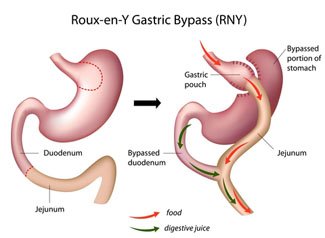Gastric bypass surgery is used to treat morbid obesity which is defined as having a Body Mass Index greater than 40. Gastric bypass is a weight loss surgery that involves both restrictive and malabsorptive technique to achieve weight loss.
The second basic component of gastric bypass surgery is the reconstruction of the GI tract which allows the newly partitioned stomach segments to drain properly. The method used in this reconstruction can differ in the lengths of small bowel used, the degree to which food absorption is affected, and the likelihood of adverse nutritional effects.

Roux-en-Y Gastric Bypass Surgery
Roux-en-Y Gastric Bypass is the most common form of gastric bypass being performed today. This procedure has been shown to be effective and safe over long term duration and thus it is widely accepted by both surgeons and insurance companies as the leading choice for weight loss surgery. The Roux-en-Y gastric bypass involves separating the stomach into a smaller, upper pouch and a larger, lower section, while the small intestine is divided and rerouted. The new small pouch is created at the top of the stomach where the food enters using staples to completely separate it from the lower portion of the stomach. The remaining larger, lower portion of the stomach is bypassed but not removed from the body as it is in something like the gastric sleeve surgery. Since the natural stomach outlet is located in the bypassed portion of the stomach it is also bypassed meaning a new connection is created to the intestines.
Advantages of Gastric Bypass
Typically most people will lose about 10 to 20 pounds in the first month after the surgery. Weight loss will continue but decrease over time. The people who see the best results are those who adhere to a strict diet and exercise routine, which is essential to keeping the weight off long term. In addition the following are benefits one can expect from gastric bypass surgery:
- Increased weight loss due to being a restrictive and malabsorptive surgery
- Verified long term success
- Insurance coverage is likely
Gastric bypass surgery not only has the obvious benefit of helping shed weight, but it can help improve a variety of medical conditions that are related to obesity.
- Type 2 Diabetes
- High Cholesterol
- High Blood Pressure
- Type 2 Diabetes
- Sleep Apnea
- Hypertension
- Joint Pain
- Asthma
Disadvantages of Gastric Bypass
With any other major medical procedure, there is the potential for gastric bypass complications ranging from minor to major. It is understanding the potential for those risks and managing accordingly that will best help you get through anything that may come arise.
- Complex operation comes with risks including infection and bleeding
- “Dumping Syndrome” is associated with this procedure
- Potential for vitamin and nutrient deficiency due to malabsorptive component of this surgery
The Cost of Gastric Bypass
When considering if gastric bypass surgery is right for you, the cost of the surgery is a major consideration. Read more to learn more about the cost of gastric bypass.
Gastric Bypass Complications
There are complications associated with all weight loss surgeries. It is understanding what to expect and how to manage those complications that will. Read more to learn more about the potential complications of gastric bypass surgery.




